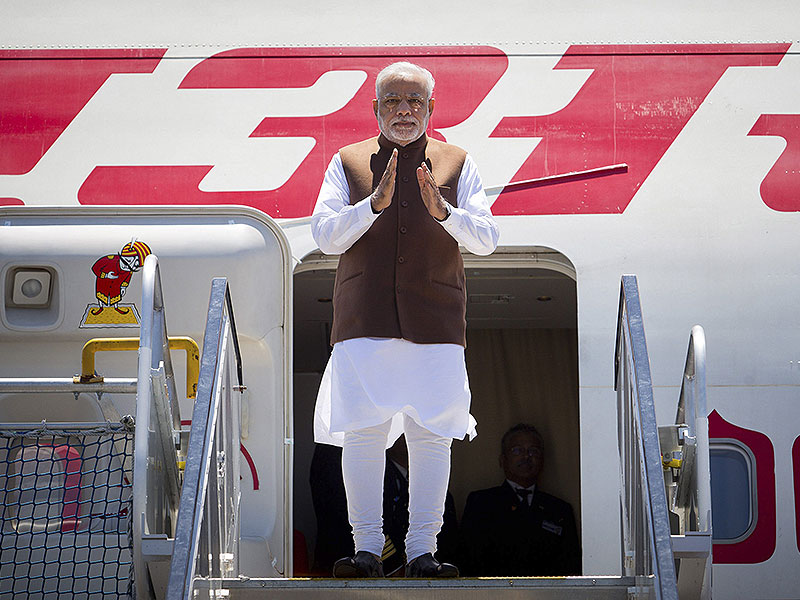
Brisbane: As India’s attempts to unearth black money stashed abroad continues, Prime Minister Narendra Modi will push for stepping up global cooperation against the key issue of cross border tax avoidance and evasion at the G20 summit starting on Saturday.
Modi, who is the first Indian Prime Minister to visit Australia in 28 years since Rajiv Gandhi in 1986, arrived in Brisbane on a five-day trip to Australia on the second leg of his 10-day three-nation tour.
He will also undertake a bilateral visit to the Australian capital Canberra for talks with Premier Tony Abbott on Tuesday.
The Prime Minister will also utilise the two-day 9th G20 summit of the world’s biggest developed and emerging economies, to flag India’s concerns over “jobless growth” prospects.
Ahead of the summit, Modi felt that focusing on transforming the quality of life of people and not just on issues like the health of the financial markets was necessary for creating employment-generating economic growth.
It was a bright and sunny day at Brisbane as Modi stepped out of his Special Air India plane at the international airport after an overnight flight from Myanmar capital Nay Phi Taw where he attended two back-to-back international summits and had a string of bilateral meetings.
“Reached Brisbane. It is bright and sunny outside,” Modi tweeted.
Modi was received at the airport by the Queensland Premier Campbell Newman among others. Indian High Commissioner in Australia Biren Nanda was also present.
“A key issue for me would be to highlight the importance of international cooperation against black money,” Modi had said, as he is set to renew the country’s commitment to a global response to deal with cross border tax avoidance and evasion.
Modi had also said he intends to discuss how G20 can accelerate creation of next generation infrastructure, which also includes digital infrastructure and ensure access to clean and affordable energy.
The G20 includes 19 individual countries — Argentina, Australia, Brazil, Canada, China, France, Germany, India, Indonesia, Italy, Japan, South Korea, Mexico, Russia, Saudi Arabia, South Africa, Turkey, the UK and the US — and the European Union (EU).
Collectively, the G20 economies account for around 85% of the GDP, 80% of world trade and two-thirds of the world population. The G20 was launched in 2008 in the US.
Jobs and growth will remain the focus of the G20 summit, despite strenuous lobbying to shift the spotlight to climate change and Ebola.
Australia, which holds the G20 presidency, on Friday re-emphasised the summit’s mission when Treasurer Joe Hockey stressed the heavy burden on group members “to get real outcomes”.
“We have a plan before the leaders of the world to grow the world economy, to create the jobs that are necessary, to lift people out of poverty, and we are determined to deliver that,” he said.
On the table is Australia’s call for the G20 to collectively add at least two per cent to world growth to 2018. If successful, this could generate millions of jobs, massive infrastructure activity and cut red tape.
G20 countries have also produced 1,000 plans to support the growth target.
Modi, referring to his four-city Australia visit that covers Brisbane, Melbourne and Sydney besides Canberra, had earlier said, “While we have much in common with Australia, our political, strategic and economic relations have been below potential.”
“A closer strategic partnership with Australia will support India’s economic goals; promote our security interests, including maritime security; and, reinforce our efforts to foster a climate of peace and stability in our extended continental and maritime neighbourhood,” he said.
Indian officials said that the prime minister’s trip will be a “landmark visit” and is aimed at “re-engaging” Australia.
Prime Minister Abbott had a telephonic talk with Modi before his departure from India to discuss the agenda for the multilateral meeting and he asked the Indian leader to share, in particular, his vision for accelerating global economic growth and employment generation.
Abbott conveyed that he and the Australian people were keenly awaiting the visit of Modi, who appreciated his personal attention to his visit and emphasised the importance he attached to his Australia visit as a step towards qualitatively transforming a relationship that he greatly values.
Abbott also sought Modi’s support for Australia’s infrastructure initiatives in the G20.
On his part, Modi thanked Abbott for his leadership in developing a meaningful agenda for the G20 Summit and expressed confidence that it would be one of the most memorable G20 Summits, which will impart new momentum to the global economy.
Modi also suggested that, in addition to facilitating financial flows for infrastructure financing, there was a need to look at innovative mechanisms for infrastructure development, including research on transforming waste into infrastructure inputs.
During the telephonic conversation, Modi also talked about creating a virtual centre for information exchange, guidance, identifying opportunities and facilitating flows, which would be beneficial to the poor countries as well.
Modi and Abbott had summit talks in Delhi last month during which India and Australia sealed a civil nuclear deal.
On the sidelines of the G20 summit, Modi is due to hold a series of bilateral meetings including with Germany’s Angela Merkel, UK’s David Cameron and France’s Francois Hollande.
Modi will also have an informal interaction with Chinese President Xi Jinping during a meeting of leaders of five-nation BRICS.
Modi has already met Chinese Premier Li Keqiang on Thursday in Nay Phi Taw. Modi is also due to address a joint sitting of Federal Parliament in Canberra and the Indian community at a reception at the Olympic park in Sydney.
Modi will travel to Fiji on a day-long visit on November 19 before returning home the next day. He will be the first Indian Premier to visit the south Pacific Island nation after a gap of 33 years, the first being Indira Gandhi in 1981.
